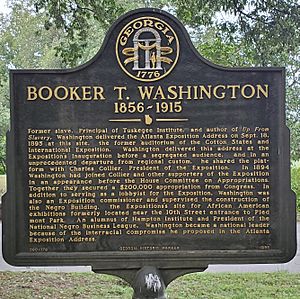Atlanta Compromise facts for kids
The Atlanta Compromise was a big idea that came from a speech given by Booker T. Washington. He was the president of the Tuskegee Institute. He gave this important speech in Atlanta, Georgia, on September 18, 1895. At first, other African-American leaders like W. E. B. Du Bois supported it. But later, some of them disagreed with it.
In his speech, Booker T. Washington suggested that African Americans should focus on learning practical skills. This included things like vocational education (training for specific jobs) and industrial trades. He believed these skills would help them get jobs and become financially successful. For a while, he thought it was best not to demand full equality or integration right away. He also suggested that white people in the North should help fund schools for Black students.
What Was the Atlanta Compromise?

Booker T. Washington's speech had several key ideas. He suggested that, for the time being, Black people should:
- Not ask for the right to vote.
- Not fight back against racist actions.
- Accept segregation (keeping races separate) and discrimination.
- Receive basic education, especially training for jobs like teachers or nurses.
This approach was called "accommodationism." It meant trying to get along and make progress step-by-step.
Why Some Leaders Disagreed
After the year 1900, other Black leaders started to disagree with the Atlanta Compromise. The most famous among them was W. E. B. Du Bois. He and others, like William Monroe Trotter, believed that African Americans should actively fight for their civil rights. Du Bois even created the term "Atlanta Compromise" to describe Washington's ideas.
They felt that focusing only on job skills wasn't enough. They believed that demanding equal rights was also very important. Some people, like William Archer, noticed that race relations actually got worse after the compromise. He pointed to the Atlanta race riot of 1906 as a sad example. Du Bois thought this riot was a result of the Atlanta Compromise.
After Booker T. Washington passed away in 1915, many of his supporters changed their minds. They started to support the fight for civil rights more strongly. This eventually led to the big Civil Rights Movement in the 1950s.
See Also
- Atlanta Exposition Speech
- W. E. B. Du Bois
- Booker T. Washington
 | Percy Lavon Julian |
 | Katherine Johnson |
 | George Washington Carver |
 | Annie Easley |

